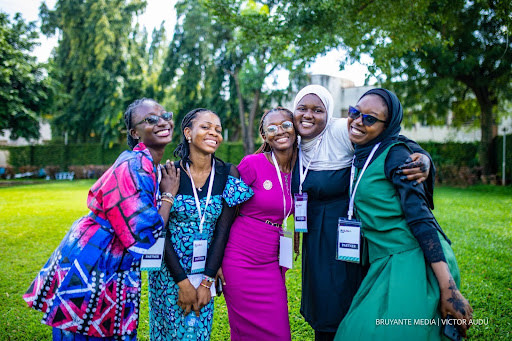
On International Day of the Girl, girls in Nigeria told policymakers what they want for their education.
Girls want a seat at the table when leaders make decisions about the future of their education. To help make that a reality, Malala Fund Nigeria organised an International Day of the Girl event in Abuja where girls could speak directly to educators, representatives of civil society organisations and policymakers about the changes they would like to see.
Several young women who participate in Malala Fund-supported programmes delivered powerful remarks at the event. As leaders and advocates, they were front and centre, with some delivering compelling speeches that highlighted the barriers they face in going to school and the solutions they believe are necessary, while others led interactive sessions or issued passionate calls to action. They spoke about safety risks, harrassment, child marriage and other obstacles. The message from girls was clear: they want leaders to prioritise their learning and create a safe, inclusive and gender responsive education system.
Halima Yusuf, a Malala Fund Girl Programme Fellow, highlighted a stark reality: “Girls are excluded from decision-making tables where their lives are shaped, especially when it comes to education, because people don’t see it as a priority.”
Sherifat Tanimu, a passionate girl advocate, declared: “Today, I stand before you as a representative of the millions of girls who demand change. We are the future leaders, innovators and change-makers. Our education is the foundation upon which our dreams are built.”
The event also included a panel session focused on policy reforms for girl education. Chimdi Neliaku, Special Assistant to the Speaker of the House of Representatives, moderated the panel, and speakers included Deborah Evbotokhai, a girl advocate with the Nigerian Girl Guides Association; Hamzat Lawal, Founder of Connected Development (CODE), a Malala Fund grantee partner; and representatives from the Ministry of Education and the World Bank. Attendees, including Plan International, and representatives from the Senate and Ministry of Education listened to girls’ demands and shared ways to collaborate and ensure their demands are met.
“As we strive for a Nigeria where girls' education thrives, we must recognise that girls are not just passengers on this journey, but navigators charting the course to their own destinies,” said Nabila Aguele, Chief Executive of Malala Fund Nigeria. “To truly transform their lives, we must bring them to the decision-making table, where their voices can shape the policies and programmes that impact their futures.”
Investing in girls’ education benefits everyone and is a fundamental human right. Key stakeholders have committed to working closely with Malala Fund’s Girl Fellows to prioritise girls’ wishes for their education. Malala Fund Nigeria will continue to leverage its grantmaking, advocacy and convening power to centre the voices of girls, driving policy change towards 12 years of education for all girls.
